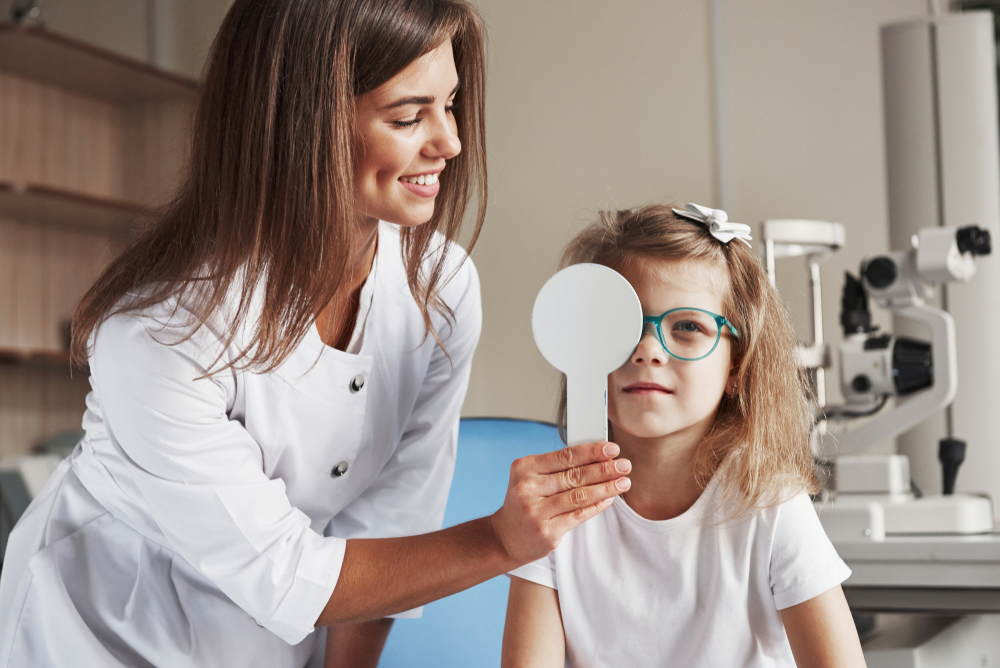
A child’s first pediatric eye exam can often be a source of anxiety for both parents and children. Understanding the process and what to expect can significantly reduce any anxiety or apprehension.
This examination is designed to detect any vision problems, eye disorders, or diseases that may impact your child's eyesight. Early detection and treatment of these issues can significantly improve your child's vision and overall quality of life. As a parent, being aware of the importance and process of a pediatric eye exam will help you ensure your child's eye health and development.
Understanding the Importance of Pediatric Eye Exam
A pediatric eye exam is more than just a routine check-up; it's an essential part of your child's healthcare. Vision problems can often go unnoticed, as children may not realize that their vision is impaired or be able to communicate their visual difficulties. Regular eye exams ensure that any issues are detected and addressed early.
Good vision is crucial for your child's development and learning. Children rely on their sight for almost 80% of their learning in the first twelve years of their life. Any vision impairment can affect their academic performance, social interactions, and overall wellbeing. Regular pediatric eye exams are necessary to ensure your child's vision is clear and healthy.
When Should Your Child Have Their First Eye Exam?
The American Optometric Association recommends that children have their first eye exam at six months of age. This initial check-up is crucial in ensuring their eyes are developing normally. Your child should have their eye exam again at three years old and just before they start school, around the age of five.
What to Expect During a Child's First Eye Exam
Understanding what to expect during your child's first eye exam can ease the anxiety you might feel. The exam will involve a series of tests to assess your child's eye health and vision. These tests are non-invasive and painless.
The eye doctor will first review your child's medical history and any vision concerns you may have. They will then conduct a series of tests to evaluate your child's visual acuity, eye alignment, eye movement, and eye health. The doctor will also check for any signs of disease or abnormalities. Remember, your child does not need to know their alphabet or how to read for these tests.
Common Procedures in a Pediatric Eye Exam
Several common procedures are included in a pediatric eye exam. These tests are designed to provide a comprehensive assessment of your child's vision and eye health.
Firstly, the eye doctor will conduct a visual acuity test, which measures how clearly your child sees. This test typically involves identifying different letters or symbols from a certain distance. Next, the eye doctor will examine your child's eye alignment and movement to ensure both eyes are working together properly.
The eye doctor will also examine your child's eye health by looking at their eye structure and checking for signs of disease. This may involve a retinal examination, which allows the doctor to see the back of your child's eye, including the retina, optic disc, and blood vessels.
How to Prepare Your Child for Their First Eye Exam
Preparing your child for their first eye exam can help make the experience less stressful for both of you. Start by explaining to your child what will happen during the exam in a simple, child-friendly language. Reassure them that the tests are not painful.
You can also play pretend eye exams at home to familiarize your child with the process. Use a toy scope to 'examine' your child's eyes, and let them do the same to you or their toys. This can make the actual exam seem less scary.
On the day of the exam, ensure your child is well-rested and fed to minimize fussiness. Bring along a favorite toy or book to comfort them if necessary.
Interpreting the Results of the Eye Exam
After the eye exam, the eye doctor will discuss the results with you. They will explain whether your child's vision is normal or if any issues were detected. If your child needs glasses, the doctor will provide a prescription that specifies the corrective power needed for each eye.
The results of your child's eye exam also include information about their eye health. The doctor will discuss any signs of eye diseases or disorders and recommend appropriate treatment or follow-up care if necessary.
Next Steps After the First Eye Exam
If your child's vision is normal and no issues are detected, the next step is to schedule their next eye exam in a year. Remember, regular eye exams are essential for maintaining your child's eye health and vision.
If your child requires glasses or further treatment, you may need to schedule additional appointments. The eye doctor will guide you through the next steps and ensure you have all the information you need to manage your child's eye health effectively.
Conclusion
Your child's first eye exam is a crucial milestone in their eye health and overall development. Understanding what to expect can help you prepare your child for the experience and manage any concerns you may have. Regular pediatric eye exams are essential in ensuring your child's vision is healthy and their eyes are developing correctly.
For more information on what to expect during your child’s first eye exam, contact Hunter Family Vision at our office in Leawood or Prairie Village, Kansas. Call (913) 681-8555 or (913) 381-2323 to schedule an appointment today. For after-hours emergency care, please call (913) 204-0239.











